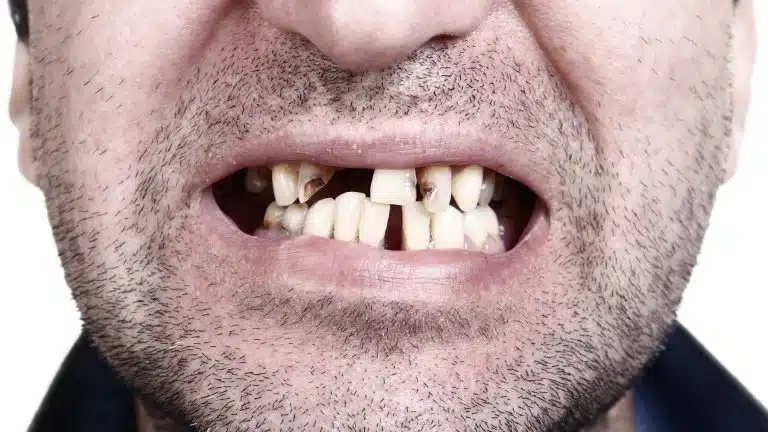Is Alcohol Bad For Your Teeth?

Chronic alcohol abuse is harmful, especially when it comes to the liver, brain, and cancer risk. But when alcohol is used too frequently over a long period of time, it impacts every part of the human body, including your mouth and teeth.
Negative Effects Of Alcohol Consumption On Dental Health
Alcohol use disorder (AUD), also known as alcoholism, alcohol dependence, or alcohol addiction, has been linked with an increased prevalence of:
- xerostomia (dry mouth, a noticeable lack of saliva)
- dental caries (cavities)
- halitosis (bad breath)
- teeth discoloration and staining
- teeth wear and grinding
- periodontal disease/periodontitis (gum infections)
- mucosal lesions (gaps or damage to the tissues of the mouth)
- elevated salivary and plaque acidity (a more acidic mouth)
- oral cancers
How Drinking Alcohol Harms Your Oral Health
Pure ethanol is not directly harmful to the teeth or mouth. So why does drinking have such a significant impact on the oral health of those with AUD?
Acidity & Sugar
Common alcoholic beverages like beer, hard cider, liquor, and mixed drinks are all strongly acidic and contain a large amount of sugar, which work to erode tooth enamel and promote the growth of “sugar bugs,” or harmful bacteria in the mouth like Streptococcus mutans.
High sugar content, acidity, and bacterial growth are a recipe for tooth decay, leading to expanding cavities that may require complex repairs or tooth removal.
Dry Mouth
Drugs, including tobacco, alcohol, and a large number of different prescription medications, are known to cause dry mouth, a condition in which the salivary glands don’t make enough saliva (spit) to keep your mouth wet.
Dry mouth can be annoying and frustrating, causing sensations of dryness, stickiness, thickness and making it harder to chew, speak, and swallow. And it can cause bad breath.
But low saliva flow also has the potential to be damaging. Without enough saliva your mouth will have trouble washing away harmful bacteria, food, and drink, potentially leading to plaque buildup, tooth decay, gum disease, mouth sores, and infections.
Poor Oral Care
Those heavily under the influence of alcohol often forget to brush their teeth, floss, or use mouthwash.
And while we all miss a night or morning once in a while, chronically neglecting oral care and proper mouth and tooth hygiene may result in permanent damage to the teeth and potentially other parts of the mouth as well.
This risk is also greatly increased as individuals begin to experience mental decline, confusion, and memory issues, all of which are common long-term effects of alcohol misuse.
Gum Disease
While not typically present in a healthy mouth, lack of proper oral hygiene and ingestion of sugary, acidic drinks can create the perfect environment for Porphyromonas gingivalis to begin to grow.
This harmful bacteria and others like it will dig in and damage the soft tissues of the mouth leading to periodontitis, a serious inflammatory disease that affects the tissues and the alveolar bone that support the teeth.
Ethanol itself is also known to be directly irritating and harmful to the soft tissues of the mouth and gum health in particular, which can contribute to gum inflammation, gum loss, and loss of support for the teeth.
Chromogens
Chromogen is a loose term used in chemistry to define substances that cause color changes. And many different mixed drinks and alcoholic beverages contain chromogens, especially red wine, dark beers, colas, and other dark sodas.
While these substances can affect any tooth with enough exposure, they react strongest when the enamel has been loosened up and damaged, often leading to the teeth becoming noticeably more stained as a person’s reliance on alcohol deepens.
Oral Cancers
When a person drinks alcohol, ethanol is absorbed into the bloodstream and broken down by the liver into acetaldehyde before finally being converted into acetic acid.
Unfortunately, acetaldehyde is a known carcinogen that irritates various tissues in the body and can damage the cellular DNA, leading to a wide-range of different types of cancer.
Approximately 10% of all cancers in the United States are attributed to alcohol consumption, including many cancers of the mouth and throat.
Finding Care
If you or a loved one have experienced any of these harmful health effects related to alcohol abuse and oral health, it’s important that you seek appropriate medical or dental care as soon as possible.
However, without also addressing and ceasing problematic alcohol use, these long-term effects will likely continue.
To learn about our substance abuse treatment services, please contact us today.
Written by Ark Behavioral Health Editorial Team
©2024 Ark National Holdings, LLC. | All Rights Reserved.
This page does not provide medical advice.
British Dental Journal (BDJ) - The relevance of alcohol to dental practice
Centers For Disease Control and Prevention (CDC) - Oral Health Tips
Journal of Clinical & Diagnostic Research - Impact of Alcohol Dependency on Oral Health – A Cross-sectional Comparative Study
Mayo Clinic - Dry mouth - Symptoms and causes

Questions About Treatment?
Ark Behavioral Health offers 100% confidential substance abuse assessment and treatment placement tailored to your individual needs. Achieve long-term recovery.
100% confidential. We respect your privacy.
Prefer Texting?
Our friendly support team is here to chat 24/7. Opt out any time.







 Learn More
Learn More








